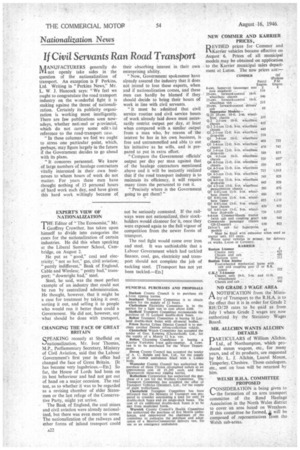EXPERTS VIEW OF NATIONALIZATION THE Editor of " The Economist," Mr.
Page 24

If you've noticed an error in this article please click here to report it so we can fix it.
I Geoffrey Crowther. has taken upon himself to divide into categories the cases for the nationalization of certain industries. He did this when speaking at the Liberal Summer School, Cambridge, on August 2.
He put as "good," coal and electricity; "not so hot," gas, civil aviation; "purely indifferent," Bank of England, Cable and Wireless; "pretty bad," transport; "downright bad," steel.
Steel, he said, was the most perfect example of an industry that could not be run by centralized administration. He thought, however, that it might be a case for treatment by taking it over, sorting it out, and selling it to people who would run it better than could a Government. He did not, however, say what should be done with transport, CHANGING THE FACE OF GREAT BRITAIN
SPEAKING recently at Sheffield on nationalization, Mr. Ivor Thomas, M.P., Parliamentary Secretary, Ministry of Civil Aviation, said that the. Labour Government's first year in office had changed the face of Great Britain. [It has become very lugubrious.-ED.] So far, the House of Lords had been on its best behaviour and had not got out of hand on a major occasion. The real test, as to whether it was to be regarded as a revising chamber of elder Statesmen or the last refuge of the Conservative Party, might yet arrive.
The Bank of England, the coal mines and civil aviation were already nationalized, but there was even more to come. The nationalization of the railways and other forms of inland transport could
not be seriously contested. If the railways were not nationalized, their stockholders would clamour for it, once they were exposed again to the full vigour of competition from the newer forms of transport.
The real fight would come over iron and steel. It was unthinkable that a Labour Government which had tackled finance, coal, gas, electricity and transport should not complete the job of tackling steel. [Transport has not yet been tackled.-Eol




































































